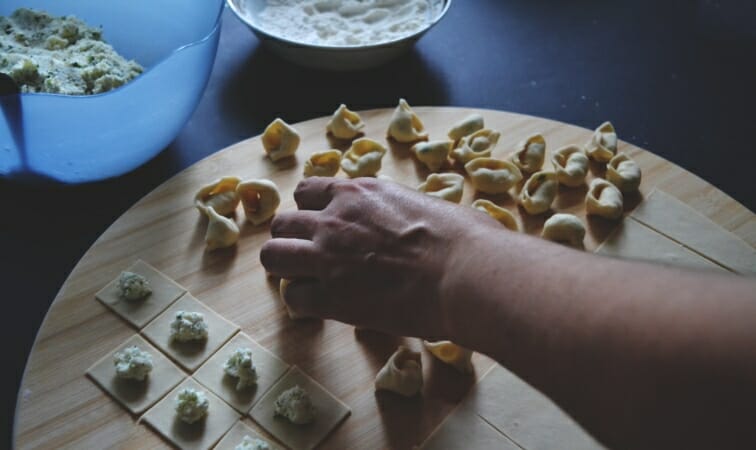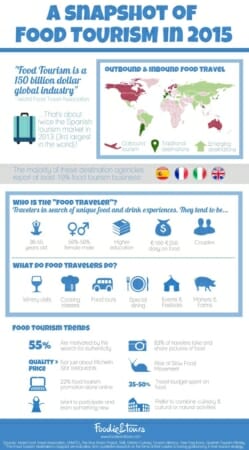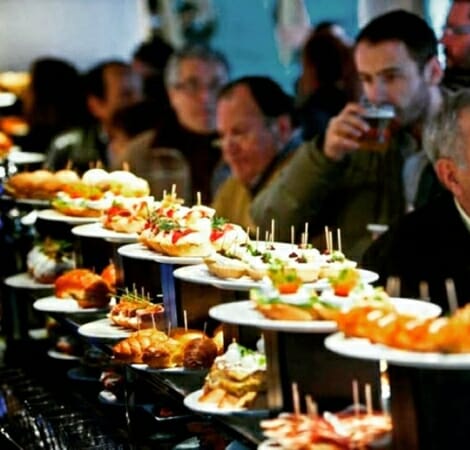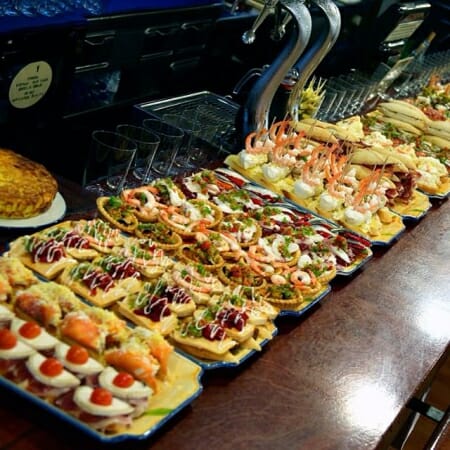Gap in the Market Volume 7 - Food Tourism
As part of our 'Gap in the Market' series, we've been taking a closer look at different sectors of the travel industry. Each post outlines a potential niche that might be ripe for a new marketplace, crunches some of the numbers, and looks ahead to what could be in store for the future. Today we're delving into the wonderful world of food tourism...

Foodie travel has become big business, and cuisine is quickly becoming a key driver for food-conscious (no, not couscous) tourists. And as the culinary-curious continue to flock to tasty destinations around the world, whole markets are beginning to develop to cater for their every desire: Wine tastings, street food tours, morning market expeditions, cookery classes, fine dining in the home of your favourite chef - the list goes on and on. And so do the potential business opportunities.
When you think about it, the rise of food tourism makes a lot of sense. In a travel industry where many tourists venture thousands of miles and end up with all the same old home comforts, food and drink offer inescapable and total authenticity. It's a way to truly connect with a destination and its culture, not just a fantastic way to spend an evening!
Perhaps more so than other sectors in the travel industry, food tourism has that extra ability to entice. Indeed, one thing fuelling its rapid rise is the wave of social media content that gives so many food tourism operators free publicity. (I'll take your tweet of tapas in Manchester and raise you an Instagram of paella lovingly stirred by a Michelin-starred chef in the heart of Valencia - or something like that...) As Skift's 2015 report on the subject pointed out:
Every traveller today has the ability to digitally share their culinary experiences with friends and strangers around the world, fuelling a veritable social media arms race to determine who has the most unique food and beverage experiences.
It's an arms race! Who can post the most appetising Crème brûlée?
This notion that social media is having a tangible impact on the food tourism market is more easily understood alongside another trend concerning the kind of trips that the next generation, those pesky millennials, want to go on. As well as being the most active generation on social media, millennials have a special relationship with food and drink - even more so going forwards. This is arguably for three reasons:
They crave authenticity
Young people today are all about being real. The closer they can get to the source of something, the more comfortable they are with buying into it. So when it comes to food, they want to know how it was produced and who by - two cravings that are easily satisfied by many food tour companies promoting local produce.
In theory, taking a look at millennial travelers’ preferences today should give us an indication of what will become mass-market trends five years from now. Those millennials have totally embraced the sharing economy and online bookings, and standard hotels for independent accommodation - so why expect any different as their tourism is increasingly determined by food glorious food?
Millennials' purchasing power is on the up
Boom. Purchasing power. According to Skift’s research report “The Rise of the Millennial Traveler,” the purchasing power of millennials is 0 billion per year and growing. And what drives this spending? According to Skift's research, it's "happiness, passion, diversity, sharing and discovery". Croissant, anyone?...
They want to go deeper
This is pretty similar to the authenticity point, but perhaps takes it one step further.
As well as getting an authentic taste of a destination, immersive travel experiences are becoming all the rage. Plenty of travellers now want to live, eat and drink like a local. Websites such as EatWith offer opportunities to do exactly that. It's kind of like AirBnB, but you drink wine and eat with strangers as they tell you about their city. You're like the long-lost relative they never knew they had. But for one night only!
This idea of going deeper also links nicely with the social media furore around food tourism. Travellers want to share their experiences more than ever, especially when those experiences illustrate what a place is really like. Food manages to unlock that door.
There's more to the food tourism wave than hungry millennials
Aside from the millennial-driven hunt for authenticity, it's also a fact that our attitude towards food is changing more generally.
A report by the American Journal of Tourism Management released in 2013 argued that the growth of food tourism is because people are looking at food more as a pleasure than a necessity. "People spend much less time cooking, but choose to pursue their interest in food as part of a leisure experience,” they said. In countries such as Italy and Spain where food tours are increasingly popular, dining experiences have always been about social interaction just as much as what's on the plate. Maybe the rest of us are just starting to catch up?
But although millennials will undoubtedly have a big say on food tourism going forwards, at the moment the market is dominated by those who are a little bit older. Take a look at Foodie&Tours' (more on them later) infographic below.

Plenty of interesting points to be taken from those statistics. First of all, our theory that social media has a big part to play is confirmed by the fact that last year, 63% of foodie travellers took and shared photos of their edible conquests.
Second, only 22% of food tourism was marketed online. That's a whopping 78% that wasn't, and a huge amount of potential for online marketplaces untapped as a result.
In conversation with Hugo Palomar, founder of Foodie&Tours
In a move away from the norm, this week we've been speaking to a man who has plenty of experience in food tourism, having set up his own food tour marketplace in Barcelona, Spain. Hugo Palomar is the founder and CEO of Foodie&Tours, which now offers tasty food and drink-focused tours in five countries across Europe. The company is planning a global expansion to offer tours in over 40 destinations worldwide, so it's fair to say that they are on the up.
First up, I asked Hugo about the motivation behind his food tour marketplace. "The project began because we detected that there was a market opportunity in the travel industry," he said. "There was no reference for gastronomic tourism online. Two of my great passions are travel and gastronomy, and we believed we could create a successful platform."

Hugo and his team are striving to become a global leader in the field of gastronomic tourism, and although that's now a realistic prospect, there have been challenges along the way.
"The biggest challenge," says Hugo, "has been to create a technological platform and a team with very limited resources." Like any startup, "We need dreamers, as well as investors who believe in the project to finance us. Part of the strategy of the company is to grow in terms of resources without jeopardizing our future viability. Taking forward steps is complicated because our company needs a big sales volume to expand, but gradually we are getting there."
When you create a company like ours and realise that your competitor is a global monster, you have to adapt your strategy." - Hugo Palomar, Founder of Foodie&Tours
It's clear that sometimes it's important to take things slowly and progress at a steady rate, instead of reaching beyond your limits. Palomar says that the main factor to affect the growth of Foodie&Tours has been dealing with limited resources, not to mention the fact that his company is competing with Trip Advisor, which he describes, fairly, we'd suggest, as "a global monster."
"The main factors [affecting growth] are the resources that are dedicated to the growth of the company. The second is the ability to grow in destinations when competing on channels to attract traffic and sales with the likes of Trip Advisor. When you create a company like ours and you realise that your competitor is a global monster, you have to adapt your strategy."

After a strong start in the food tourism market, is there anything that Hugo would do differently if given the chance again? He points out that the lessons learned on the journey can be just as important as growth itself. "We did a lot of things at the beginning that we would not do now," he says. "But the important thing is not so much what we would do, but that we have learned to realise this, and how the team reacts. This is a project that only succeeds with highly-motivated people working together - this is the key!"
Looking forwards, the future looks bright for Foodie&Tours, along with any other startups that decide to aggregate food tourism providers across national borders.
"I sincerely believe that foodie tourism is a market with a high growth," he says. People and travellers want to live real experiences, and there is nothing better than to live those experiences through food, drink, traditions and customs of the land."
Hugo predicts that more and more local operators will start to spring up and offer food-related activities. He also suggests that larger, umbrella companies with the right technology will be able to build franchise systems connecting thousands of entrepreneurs together. One thing's for sure: food tourism is here to stay, and Foodie&Tours are well ahead of most of the competition.
If all this talk of culinary delights has given you an appetite, check out the Foodie&Tours website to find a food tour near you.
Thinking about starting your own marketplace for food tourism?
That's pretty much what we do. Having successfully built Iceland's leading travel marketplace, we're offering up our software solution to ambitious entrepreneurs with a passion for tourism. Our marketplace solution is packed with features to help you get up and running in no time at all, and you'll be backed the whole way by our knowledgeable and experienced team.
Travelshift software offers a community-driven platform that allows you to manage your sellers, their inventory, content marketing, and all transactions in a single, easy-to-use solution. All you have to do is choose your travel niche, attract vendors to your marketplace and go. Interested? Get in touch with us today to find out more.
In the meantime, here are a few insider tips for making an impact in food tourism
Work with a local network to create experiences that will sell
Once you've established a local network of operators, co-create new experiences to fill the gaps and make the most out of the destination. Meals, tastings, cooking classes, educational trips and entertainment can all be combined with accommodation to build up a series of dynamic products that will appeal to a wide range of visitors.
Social media promotions go a long way, especially when combined with different sectors
As we've already seen, social media is particularly powerful in an evocative travel sector such as food tourism. Expanding an already extensive reach can be done by simply scheduling tours that cover more than one base. Why not combine food with culture, appealing to a larger audience that wouldn't necessarily choose to do one excursion exclusively. Reaching beyond the die-hard foodie type is vital if you want to see real growth.
Engage and inspire with quality imagery
Pictures say a thousand words, but they can also taste good. Your food tour business will live and die by how appealing your products are to browsing customers. Promotional campaigns have to be immersive and inspiring, with bold and professional photography. This kind of content is a sure way to encourage organic engagement.